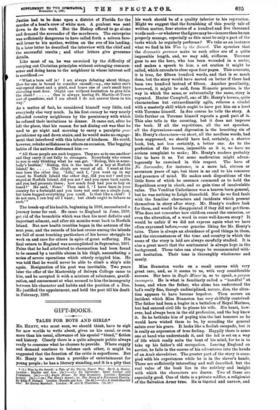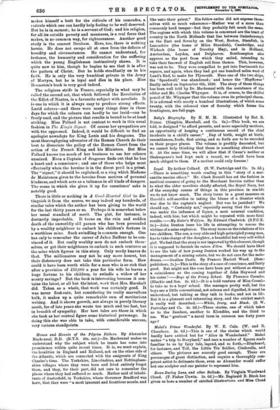GIFT-BOOKS.
TALES FOR BOYS AND GIRLS.*
Mn. HENTY, who must soon, we should think, have to sigh for new worlds to write about, gives us his usual, or even more than his usual, allowance of his special "blend," fiction and history. Clearly there is a quite adequate public always ready to consume what he chooses to provide. Where supply and demand continue to balance each other, it might be suggested that the function of the critic is superfluous. But Mr. Henty is more than a provider of entertainment for young people; he has a literary standing, and it is a pity that ° (L) Won by the Sword: a Tale of the Thirty Years' War. By G. A. Henty. London : Blackle and Son. [6s.]—(2.) No Surrender. Same Author and Publishers. [6s.]—(3.) Bugle Minor. By Miss Brunton. London : National Society. [2s.]—(4.) The King's Signet ; or, The Story of a Huguenot Family. By Eliza P. Pollard. London : Mackie and Son. [3s. 6d.)—(5.) A Good-Hearted Girl. By Emma Marshall. London : W. and R. Chambers. 13.. 6d.1 his work should be of a quality inferior to his reputation. Might we suggest that the furnishing of this yearly tale of written matter, four stories of a hundred and five thousand words each—or whatever the figure may be—is more than he can properly manage, especially as this must be only a part of the tasks which he regularly performs ? We take as an instance what we find in his Won by the Sword. The speeches that the dramatis personce make to each other are of a quite impossible length, and, we may add, stiffness. Turenne goes to see the hero, who has been wounded in a sortie, and makes a speech to him, a set oration it might be called, which extends to close upon four pages. This accounts, it is true, for fifteen hundred words, and that is so much done, but the story would have moved on better if there had been two hundred instead of fifteen. Another peculiarity, borrowed, it might be said, from Homeric practice, is the way in which the same, or substantially the same, story is repeated. Hector Campbell, one of Mr. Henty's heroes, quite characterless but extraordinarily agile, relieves a citadel with a masterly skill which ought to have put him on a level with Turenne himself. In due course he tells the story. A little further on Turenne himself repeats a good part of it. This also tells in the counting, but it does not improve the book. If all the repetitions, all the set speeches, all the digressions—and digression is the besetting sin of Mr. Henty's characters—in short, all the needless words, had been suppressed, we should have had, certainly, a shorter book, but, not less certainly, a better one. As to the perfection of the heroes, impossible as it is, we have no serious complaint to make ; Mr. Henty's readers probably like to have it so. Yet some moderation might advan- tageously be exercised in this respect. The hero of No Surrender, for instance, is a mere lad, sixteen or seventeen years of age, but there is no end to his resource and presence of mind. He makes such dispositions of the little force of which he assumes command as to hold the Republican army in check, and so gain time of incalculable value. The Vendean Cathelinean was a heaven-born general, but be was nothing to Leigh Stansfield. Nor do we find fault with the familiar characters and incidents which present themselves in story after story. Mr. Henty's readers look for them, and would be disappointed if they did not get them. Who does not remember how children resent the omission, or even the alteration, of a word in some well-known story? It would be unfair if we did not express again what we have often expressed before,—our genuine liking for Mr. Henty's tales. There is always an abundance of good things in them, and the circumstances of the time and country in which the scene of the story is laid are always carefully studied. It is also a great merit that the sentimental is always kept in the background. These tales can always be recommended with- out hesitation. Their tone is thoroughly wholesome and manly.
Miss Bramston works on a small canvas with very great care, and, as it seems to us, with very considerable success. Her hero in Bugle Minor is, so to speak, a garcon inecmtpris. He is what is familiarly called a " handful " at home, and when the father, who alone has understood the lad's really fine, though undisciplined, nature, dies, the situa- tion appears to have become hopeless. Then occurs an incident which Miss Bramston has very skilfully contrived- The father had been a bugler in a battalion of Royal Marines, but had entered civil life to please his wife. His heart, how- ever, had always been in the old profession, and the boy knew it. So he bethinks him of paying him the last honours as he would have wished them to be, by sounding the general salute over his grave. It looks like a foolish escapade, but it is really an expression of true feeling. Happily there is some one at hand who understands it, and the lad is set on a way of life which really suits the bent of his mind, for he is to take up his father's old occupation. Leaving England on service, he falls in the course of his adventures into the hands of an Arab slavedriver. The greater part of the story is occu- pied with his experiences while he is in the slaver's hands, These are sufficiently interesting and well described, but the real value of the book lies in the subtlety and insight with which the characters are drawn. Two of these are especially good. One of than is a private soldier, a religionist of the Salvation Army type. He is bigoted and narrow, and
makes himself a butt for the ridicule of his comrades, a ridicule which one can hardly help feeling to be well deserved. But he is in earnest; he is a servant of God; and his religion, for all its outside poverty and meanness, is a real force that makes, in no common way, for righteousness. Another good study is the convert Ibraham. Here, too, there is nothing heroic. He does not escape all at once from the defects of heredity and circumstances. He cannot understand, for instance, the humanity and consideration for the suffering which the young Englishman instinctively shows. It is quite new to him, though he begins to see that it is after the pattern of Christ. But he holds steadfastly on to his faith. He is only the very humblest private in the Army of Martyrs, but he is loyal and dies in his place. Miss Bratnston's book is very good indeed.
The religions strife in France, especially in what may be called the second act, that which followed the Revolution of the Edict of Nantes, is a favourite subject with novelists. It is one in which it is always easy to produce strong effects. Lurid colours—and there were many things done in those days for which the colours can hardly be too lurid—can be freely used, and the picture that results is bound to be at least striking. Miss Pollard is not content to work in this usual fashion in The King's Signet. Of course her sympathies are with the oppressed. Indeed, it would be difficult to find an apologist nowadays for King Louis and his dragoons. The most thoroughgoing advocates of the Roman Church do their beet to dissociate the policy of the Roman Court from the action of the French King and his Ministers. But Miss Pollard knows too much of her business to use her colours unmixed. Even a Captain of dragoons finds out that he has a heart and a conscience ; and one of those who helps most effectually when the heroine is in the direst peril is a priest. The "signet," it should be explained, is a ring which Madame de Maintenon gives to the heroine from motives of personal kindness, and which acts as a talisman in all kinds of dangers. The scene in which she gives it up for conscience' sake is notably good.
There is little or nothing in A Good-Hearted Girl to dis- tinguish it from the scores, we may indeed say hundreds, of similar tales which the author has been giving to the world for the last thirty years or so. Perhaps it is somewhat below her usual standard of merit. The plot, for instance, is distinctly improbable. It turns on the ruin and sudden death of the unworldly old parson who has been persuaded by a wealthy neighbour to embark his children's fortune in a worthless mine. Such swindling is common enough. One has only to remember the career of Jabez Balfonr to be con- vinced of it. But really wealthy men do not embark them- selves, or get their neighbours to embark iu such ventures as the mine which figures in this story. Only needy knaves do that. The millionaires may not be any more honest, but their dishonesty does not take this particular form. How could it have been worth while for a man who is so rich that after a provision of £10,000 a year for his wife he leaves a huge fortune to his children, to swindle a widow of her scanty savings P But the book is interesting because it con- tains the latest, or all but the latest, work that Mrs. Marshall did. Taken as a whole, that work was certainly good. It was never first-rate, but considering its really marvellous bulk, it makes up a quite remarkable sum of meritorious writing. And it shows growth, not always in purely literary merit, for of late years she wrote too much and too fast, but in breadth of sympathy. Her best tales are those in which she took as her central figure some historical personage. In doing this she was able to take, with considerable success, very various standpoints.























































 Previous page
Previous page